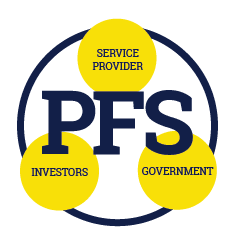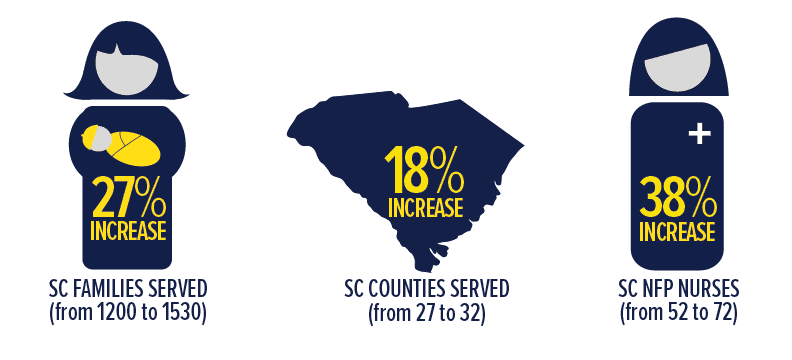Pay for Success
 Pay for Success (PFS) is a unique form of social innovation financing that allows government entities to access the private resources needed now to scale effective programs, like Nurse-Family Partnership (NFP), and achieve improved social outcomes. In 2016, NFP and South Carolina launched the nation’s first PFS project to improve maternal and child health outcomes for Medicaid eligible families.
Pay for Success (PFS) is a unique form of social innovation financing that allows government entities to access the private resources needed now to scale effective programs, like Nurse-Family Partnership (NFP), and achieve improved social outcomes. In 2016, NFP and South Carolina launched the nation’s first PFS project to improve maternal and child health outcomes for Medicaid eligible families.
Project Details
FUNDING:
This $30M project was funded by a group philanthropic investors and Medicaid reimbursement via a 1915(b) Medicaid waiver awarded to the South Carolina Department of Health and Human Services by the federal Centers for Medicare and Medicaid.
OUTCOME METRICS:
- Reduction in Preterm Births
- Reduction in Child Injuries and Hospitalizations/Emergency Department utilization
- Increase in Healthy Birth Spacing between 1st and 2nd child
- Increase in number of first-time moms served in Low-Income Zip Codes
REACH:
This PFS project allowed NFP to scale within South Carolina with 9 community-based, experienced network partners delivering the NFP program to more families, with more nurses, and in more counties than the program was previously able to reach.
Scaling Impact of South Carolina Pay for Success*

*Project Scaling information above applicable during primary project years of 2016-2020
METHODOLOGY & EVALUATION:
Using a Randomized Controlled Trial, the independent Evaluator measures the level of outcomes achieved by a certain point in the project to inform outcome payments.
PARTNERS:
Service Provider: Nurse-Family Partnership team including NFP network partners and National Service Office staff
Outcomes Payor: South Carolina’s Department of Health and Human Services
Fiscal Intermediary: Children’s Trust of South Carolina
Project Intermediary: Social Finance
Evaluator: Abdul Latif Jameel Poverty Action Lab (J-PAL) North America at MIT
Technical Assistance (Pro-bono): Government Performance Lab at the Harvard Kennedy School
Project Innovations
To successfully scale NFP in South Carolina over the four-year enrollment period, NFP also piloted a number of new innovations that are now used throughout the country. The PFS project served as an incubator for new ways to maximize efficiencies and support fidelity. These included the increased use of telehealth prior to COVID-19, the launch of new client engagement models and improvements to NFP’s Strengths and Risks Framework. NFP also launched a specially branded marketing and advertising campaign to help enroll close to 6,000 pregnant women into the study.
SC PFS Project INTERIM Outcomes
Five years into the SC PFS project, interim results were released with a partial sample of outcomes for mothers and children. The necessity of the interim study results was dependent on the PFS structure to determine if success payments should be made.
For more information about the study design, interim results and report produced by Harvard University and J-PAL North America, please visit the research team’s South Carolina NFP Study Website at www.scnfpstudy.com.
These interim results of the randomized controlled trial show that NFP did not achieve the PFS outcome goals to trigger success payments for a reduction in preterm births, an increase in healthy birth spacing and reductions in childhood injury. These PFS outcomes only provide a limited assessment of NFP over a specific time period. However, based on evidence from past studies, it is proven that NFP impacts a greater number of outcomes over the life course of the mother and child.
To listen to boisterous Zy’Aire, you’d never guess he started his life as a low-birthweight baby. During pregnancy as his growth was being monitored, his mom, Taquana, partnered with her NFP nurse Kenyetta to help her gain weight. Despite the rocky road, Taquana met her goals to breastfeed and worked hard to boost her child’s development. Two years later, Zy’Aire is full of energy and chattering endlessly!
Click here to read this incredible mom story from the Medical University of South Carolina (MUSC).
The Project Concludes and Research Continues
J-PAL, the evaluator of the SC PFS Project, will complete further analyses including a longitudinal evaluation, following these SC families for 30 years.
The most recent evaluation on the Birth Outcomes can be found by clicking here. The Birth Outcomes evaluation of the SC NFP program looks at four adverse birth outcomes: preterm birth, low birthweight, small for gestational age, or perinatal death. Additional research is ongoing to understand the program’s impact on other outcomes related to families’ health and well-being in the coming decades. Follow this link to read an interview with some of the project partners: JPAL, NFP and SC DHHS.

